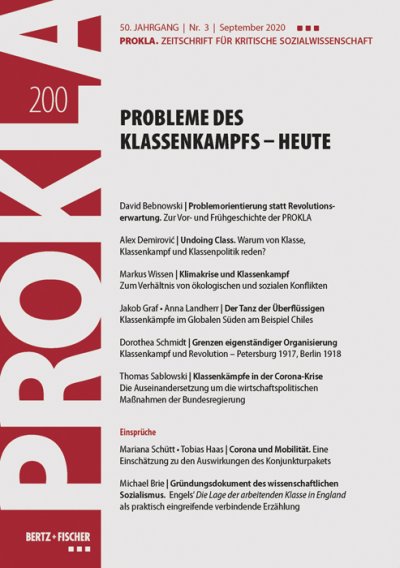Corona and mobility
An assessment of the effects of the stimulus package
DOI:
https://doi.org/10.32387/prokla.v50i200.1902Keywords:
automotive industry, Corona-Crisis, property, economic stimulus package, transport sectorAbstract
The amount of traffic decreased drastically during the Corona crisis, and the same is true for automobile production and the number of new registrations. The transport industry is correspondingly strongly addressed in the German government›s economic stimulus package. This applies to rail and local public transport as well as air transport. The absence of a general purchase premium for cars, as demanded by the car industry in agreement with the IG Metall trade union, reflects a partial loss of power on the part of car manufacturers. Nevertheless, there is a great deal of continuity in the subsidization of the automobile, which is now being further geared towards e-cars. In this respect, the economic stimulus package is primarily a stabilization and continuation of the status quo.
Downloads
References
Burmeister, Kai (2019): Umkämpfte Arbeit in der Automobil-Industrie: Das Beispiel Automotiv-Cluster in Baden-Württemberg. In: PROKLA 195 49(2): 277-294. DOI: https://doi.org/10.32387/prokla.v49i195.1823.
Canzler, Weert (2016): Automobil und moderne Gesellschaft. Beiträge zur sozialwissenschaftlichen Mobilitätsforschung. Münster.
Engartner, Tim (2018): Deutsche Bahn: Der Zug an die Börse. In: Blätter für deutsche und internationale Politik, Nr. 8: 111-119.
Haas, Tobias / Richter, Ina (2020): Der Verkehr – das Sorgenkind der Klimapolitik. In: Politikum, Nr. 2: 46-53.
Hartung, Alfred (2018): Elektro-Pkw – eine ökologische Modernisierung der Automobilität? In: PROKLA 193 48(4): 561–567. DOI: https://doi.org/10.32387/prokla.v48i193.1146.
Wassmuth, Carl (2020): Eine andere Bahn ist möglich. Wieso die Deutsche Bahn grundlegendumgebaut werden muss. In: LuXemburg. Gesellschaftsanalyse und linke Praxis, Nr. 1: 100-105.






